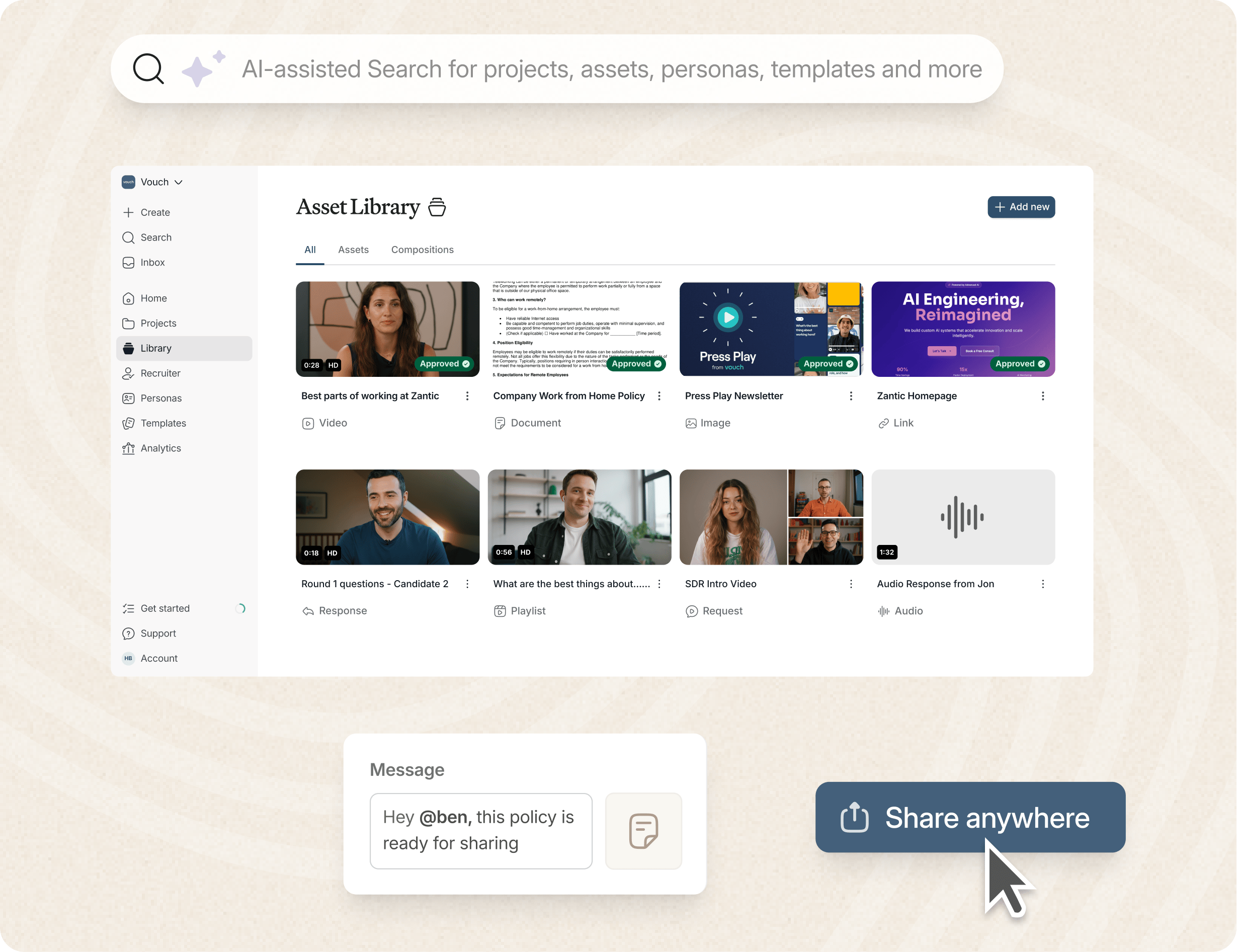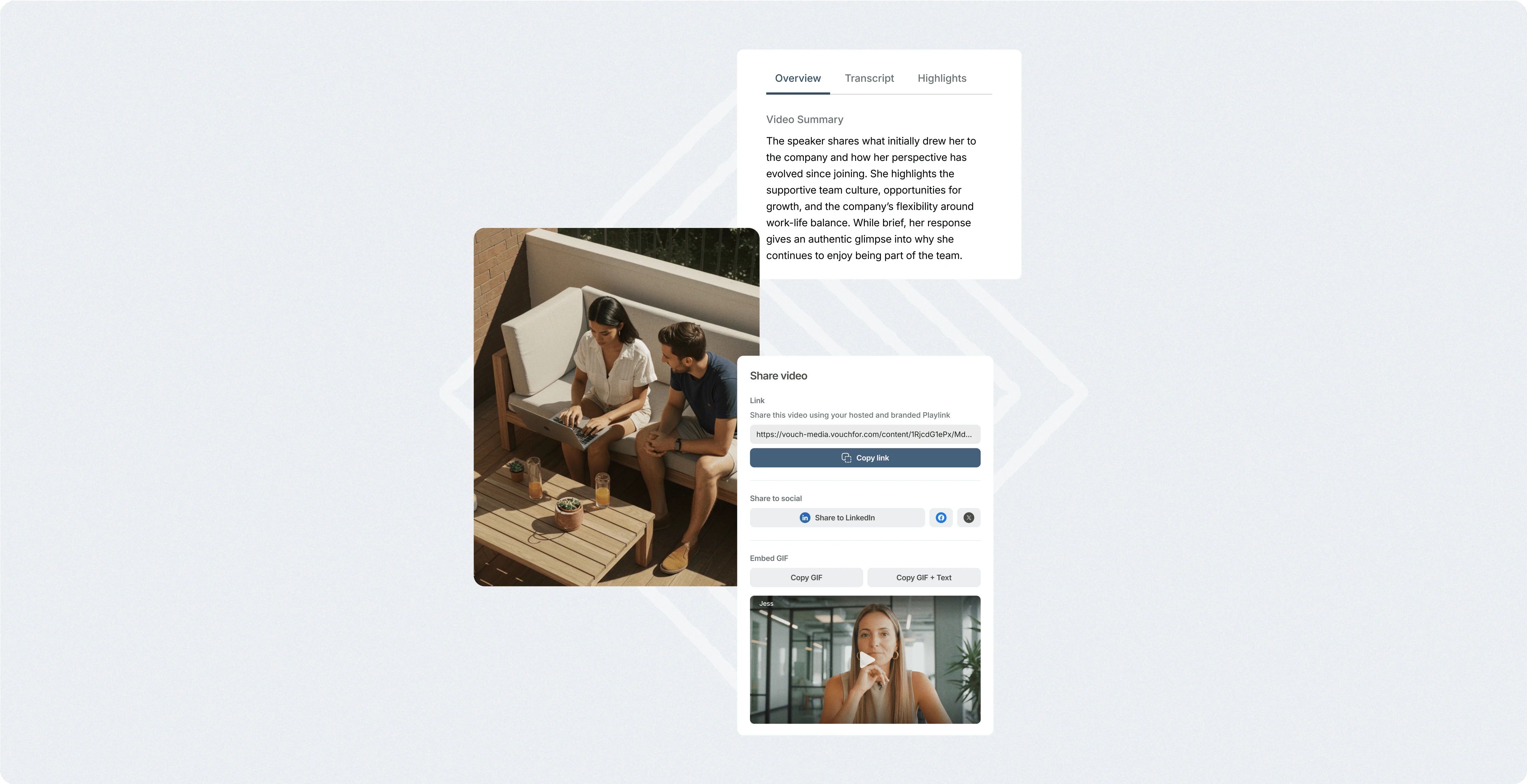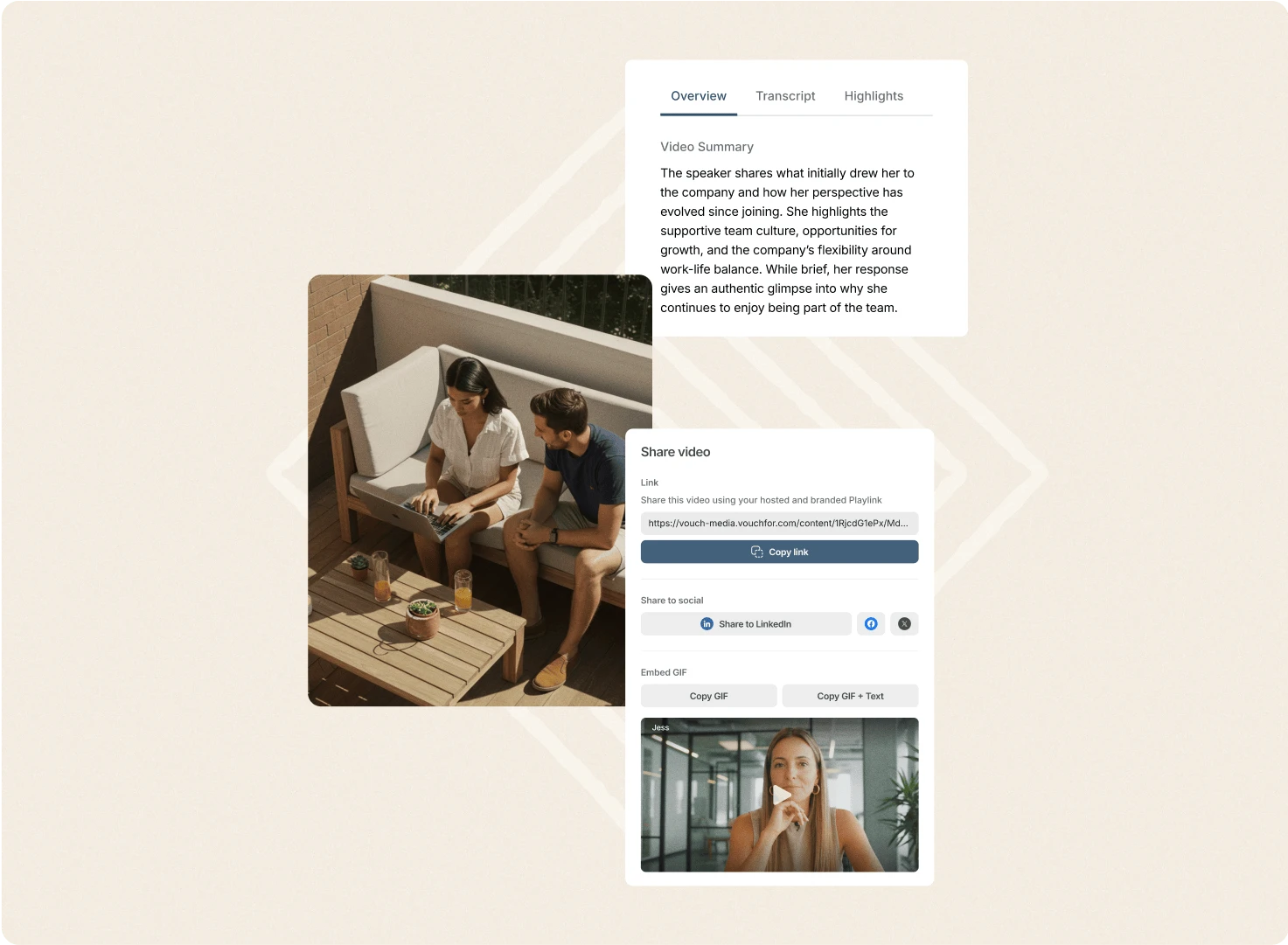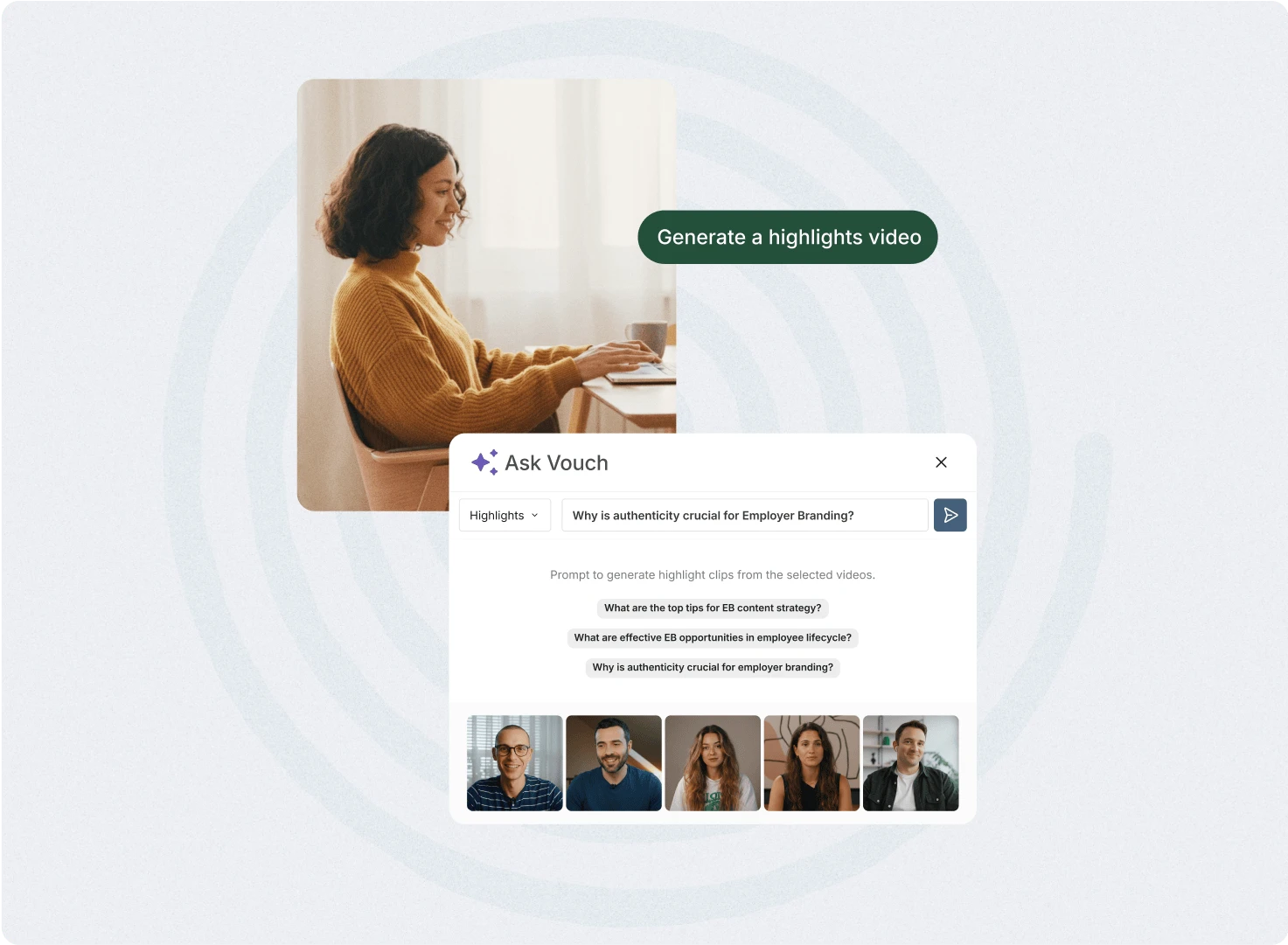In the hospitality industry today, becoming an "employer of choice" isn't a bonus - it's a survival strategy as guests become more and more demanding on service levels.
Whether you're running a luxury resort, a budget hotel chain, or a global hospitality company, your ability to attract and retain top talent hinges on one thing: your employer brand.
This guide gives you seven strategies, backed by real data and expert insights, to help your hotel or resort build a compelling employer brand that speaks to today's hospitality professionals.
Step 1. Lead With Video Storytelling Using Vouch
In the hospitality world, your people are your product.
That's why giving job seekers a real, inside look into your team and company culture is a game-changer. Vouch is one tool that helps you do just that - by letting your current team do the talking through short, authentic video testimonials.
Why Vouch video works:
- Vouch video boosts engagement: Job posts with video get 36% more applications, according to CareerBuilder.
- Vouch humanizes your brand: Employees sharing "a day with flexibility" or their path to leadership makes your brand relatable and real.
- Trusted by brands: Household names across industries use Vouch to turn their people into recruitment magnets.
Tip: Be sure to feature team members from multiple career levels, roles, and cultural backgrounds to show your diversity and wider company opportunities.
Step 2. Define Your Employee Value Proposition (EVP)
A solid EVP answers this question: "Why should someone work here instead of anywhere else in the hospitality sector?"
A strong EVP covers:
- Extensive career growth possibilities
- Inclusive culture and sense of community
- Formal benefits and care for staff
- Commitment to employability through continuous learning
Example: Hilton's EVP centres on "Thrive at Hilton," focusing on well-being, growth, and purpose. Their global brand platform is a model of clarity and authenticity.
Hilton understands that Companies with a strong EVP reduce turnover by 69% and increase new hire commitment by 29% (LinkedIn Talent Solutions).
The AI-enabled workspace for talent teams.
- Unified workspace for talent teams
- Accelerate hiring with AI tools
- Auto-generate polished hiring and employer brand content
- Easily repurpose assets across all channel

Step 3. Build Career Development into Your Culture
Today's hospitality professionals are seeking long-term careers, not stopgap jobs.
Action steps:
- Offer leadership development programs and lifelong learning opportunities.
- Highlight real stories from your employees who rose from the front desk to corporate.
- Promote clear career paths on your Career Pages and job ads.
Case Study: IHG Hotels & Resorts has launched the "Journey to Tomorrow" campaign focused on sustainability and people development. They're also part of the Hospitality Youth Project to nurture future talent.
Step 4. Launch a Memorable Employer Brand Campaign
The best employer branding examples in hospitality go beyond logos and slogans. They create an emotional connection between the employee and your brand - they create a feeling that people want to be part of.
Which hotels are doing Employer Branding well?
- Hilton is a standout, and their TBWA\Chiat\Day\New York rolled out "Every Job Makes the Stay" to spotlight real employee contributions.
- Kimpton Hotels & Restaurants created the "Magic Makers" campaign to celebrate the personality and authenticity of their team.
Here's why these efforts matter:
- 75% of job seekers consider an employer's brand before applying.
- 69% of candidates are likely to apply to a company actively managing its brand (Glassdoor).
Step 5. Create a Culture of Inclusion and Community
A strong sense of belonging is critical in the hospitality industry, where collaboration, empathy, and service define success.
Here's how to cultivate inclusion:
- Create cross-cultural experience programs and mentorship.
- Celebrate employee milestones and diverse backgrounds.
- Make room for employee-led initiatives in community engagement.
Highlight: Asia-Pacific's leading luxury hotel group, Shangri-La, actively promotes inclusion, diversity, and talent exchange across select markets.
Step 6. Use Social Media to Show, Not Just Tell
Your social media platform should reflect your workplace culture as clearly as your guest experience does.
What to share on social media:
- "Day in the life" reels of hospitality jobs
- Culture score highlights and colleague experience stories
- Community to careers success stories
Example: Hyatt's social presence is full of real employee journeys, awards, and values in action—helping them cut through a crowded marketplace of hospitality employers.
Don't rely on generic content. Let your team's voice shine through.
Step 7. Collaborate with Talent-Focused Recruitment Partners
Your HR team can't do it all, especially in today's tight job market and high competition for talent.
Thankfully, there are hospitality-focused recruitment agencies that can help you streamline your strategy. Agencies like Horizon Hospitality specialize in recruitment services tailored to the hospitality business.
What to expect from a dedicated recruitment agency:
- Smart and memorable talent acquisition pipelines, with recruiters using tools like Vouch to stand out in a crowded market
- Better alignment with your values and career development programs
- Reduced cost of acquisition through targeted placements
Who Are The Top 10 Hotels And Resorts Worldwide?
Here are the top 10 hotel and resort companies worldwide, ranked by estimated annual revenue as of 2025.
Each entry includes a brief overview and a link to their official website.
1. Marriott International
- Overview: The world's largest hotel chain, operating over 9,400 properties across 131 countries. Its portfolio includes renowned brands like The Ritz-Carlton, Sheraton, and W Hotels.
- Estimated Annual Revenue: Approximately $25.1 billion
- Website: marriott.com
2. MGM Resorts International
- Overview: A leading global hospitality and entertainment company, known for its luxury resorts and casinos, including the Bellagio and MGM Grand in Las Vegas.
- Estimated Annual Revenue: Approximately $17.1 billion
- Website: mgmresorts.com
3. Hilton Worldwide
- Overview: A prominent hospitality company with over 6,200 properties worldwide, encompassing brands like Waldorf Astoria, DoubleTree, and Hampton Inn.
- Estimated Annual Revenue: Approximately $11.3 billion
- Website: hilton.com
4. Las Vegas Sands
- Overview: Specializes in luxury resorts and casinos, with flagship properties such as The Venetian and Marina Bay Sands in Singapore.
- Estimated Annual Revenue: Approximately $11.2 billion
- Website: sands.com
5. Wynn Resorts
- Overview: Known for high-end resorts and casinos, including Wynn Las Vegas and Wynn Macau, offering premium hospitality experiences.
- Estimated Annual Revenue: Approximately $3.8 billion
- Website: wynnresorts.com
6. Hyatt Hotels Corporation
- Overview: Operates a diverse portfolio of luxury and business hotels, including brands like Park Hyatt, Andaz, and Hyatt Regency.
- Estimated Annual Revenue: Approximately $5.9 billion
- Website: hyatt.com
7. Accor
- Overview: A French multinational hospitality company managing over 5,500 hotels globally, with brands such as Sofitel, Novotel, and Ibis.
- Estimated Annual Revenue: Approximately $4.8 billion
- Website: group.accor.com
8. InterContinental Hotels Group (IHG)
- Overview: A British multinational company operating brands like InterContinental, Holiday Inn, and Crowne Plaza across more than 100 countries.
- Estimated Annual Revenue: Approximately $4.9 billion
- Website: ihg.com
9. Genting Group
- Overview: A Malaysian conglomerate with a global presence in resorts, casinos, and cruise lines, operating under the Resorts World brand.
- Estimated Annual Revenue: Approximately RM27.7 billion
- Website: genting.com
10. Host Hotels & Resorts
- Overview: An S&P 500 company and the largest lodging real estate investment trust, owning upscale hotels under brands like Marriott and Hyatt.
- Estimated Annual Revenue: Approximately $5.6 billion
- Website: hosthotels.com
FAQs
What is employer branding in the hospitality industry?
It's how hotel brands build a reputation as attractive employers for hospitality jobs.
Why does employer branding matter more than ever now?
Because post-pandemic growth means rapid hiring, but candidates have more choices than ever.
How do I attract talent to my hotel or resort?
Offer real growth opportunities, showcase authentic culture, and simplify your application process.
What role does video play in employer branding?
Video (like those made with Vouch) builds trust and brings your employer's brand to life.
What makes a compelling EVP in hospitality?
Clear opportunities for career growth, an inclusive culture, and support for employee well-being.
How do I improve employee engagement in a hotel?
Give them a voice, invest in learning, and recognize their impact on the guest experience.
Can small hotel chains compete with big brands?
Yes, by being authentic, flexible, and showing care for staff in every aspect of business.
Summary
By following these seven steps, your hotel or resort won't just fill vacancies - it'll attract people who believe in your mission, stay longer, and deliver a guest experience worth writing home about.
Whether you're running a luxury resort, a budget hotel chain, or a global hospitality company, your ability to attract and retain top talent hinges on one thing: your employer brand - and Vouch is one of the most loved tools in the Employer Branding space.
See Why Employer Branding Leaders Love Vouch!
Loved by companies like Canva, Nike, Cisco, HubSpot, Amazon, and more, tools like Vouch make leveraging employer branding strategies in your business remarkably easy.
Book a Vouch demo today and chat with an employer branding expert about your business needs.
You might also like

Elevate Your Brand Today With Vouch
Discover how Vouch can accelerate talent acquisition while helping you stay on-brand.






